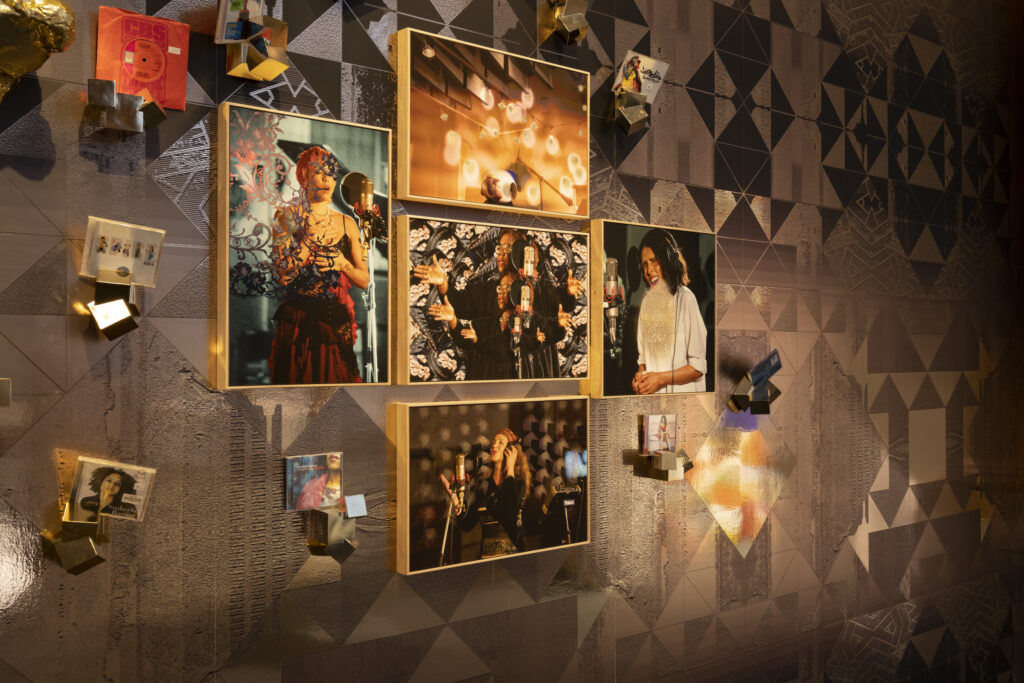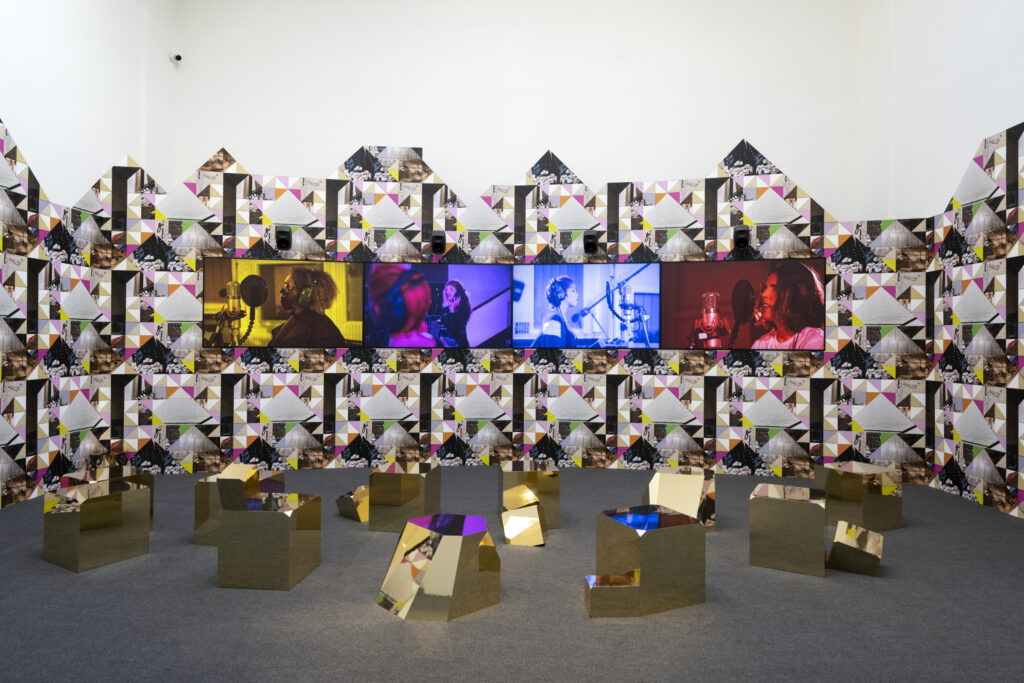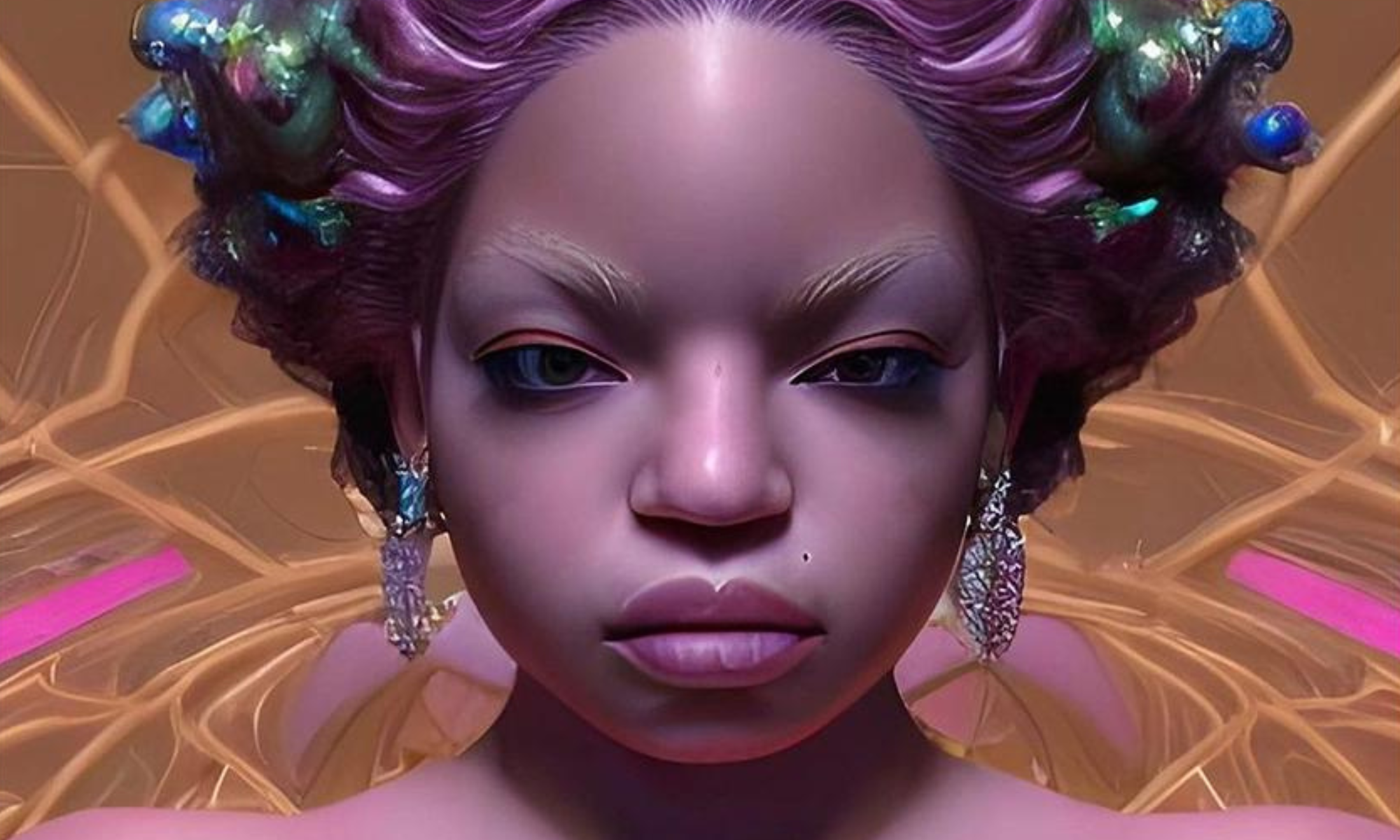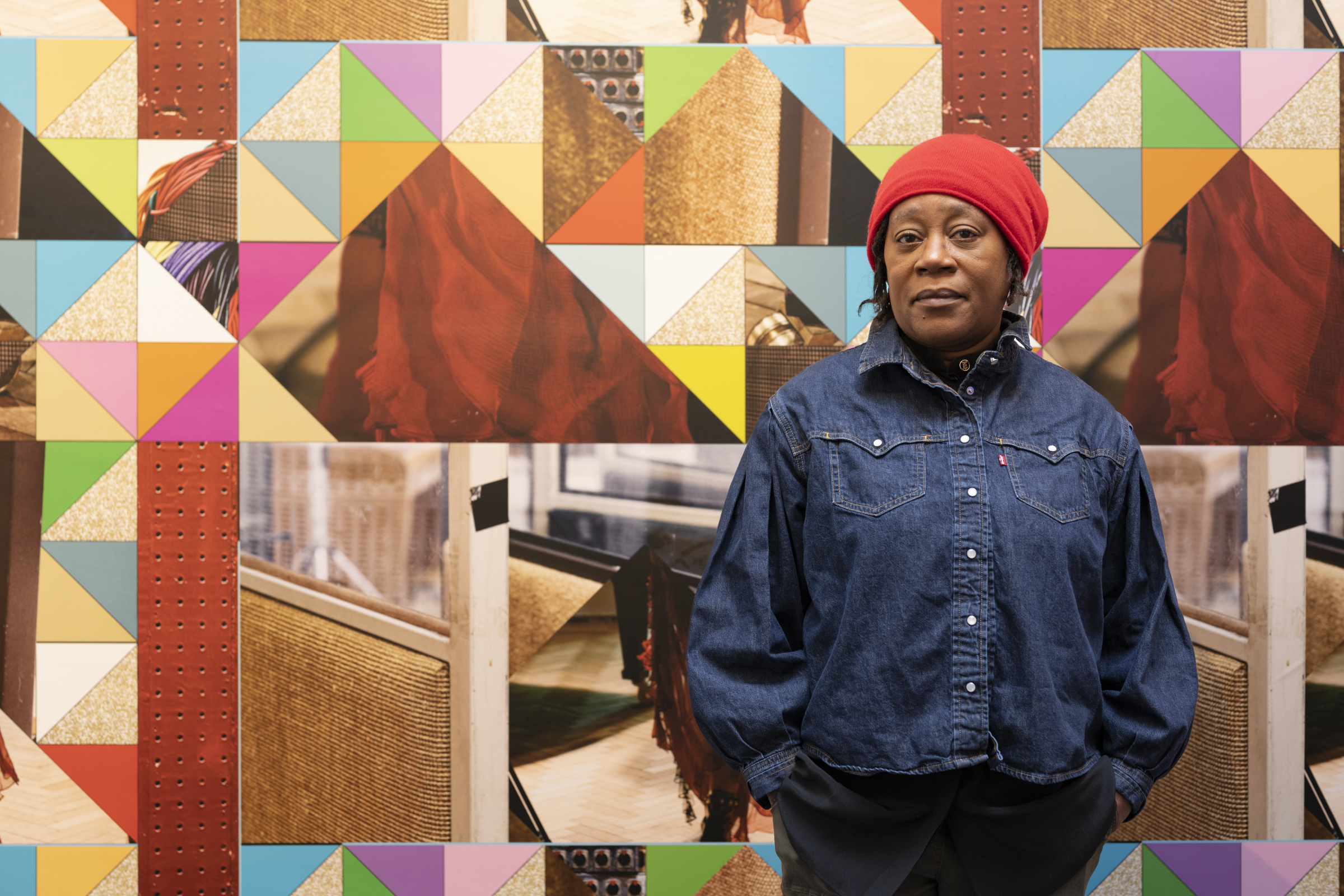
Cristiano Corte, copyright British Council
Inside a prize-winning ode to Black women in music at the Venice Biennale
This year, Sonia Boyce became the first Black-British woman to represent Britain at the world's most prestigious art event. Yet the artist doesn't take that as a compliment.
Precious Adesina
19 May 2022
In 1999, London-based artist and academic Sonia Boyce held a workshop in Liverpool, giving women the opportunity to reflect on the first records they ever bought. At the end of it, Sonia asked the group to name a Black British female singer, but something unexpected happened. “It took us a really long time – 10 minutes of ‘Oh God, we’ve got to remember someone,’” she says. Eventually, a participant came up with the internationally recognised Welsh vocalist Shirley Bassey. “We all got up and sung ‘Big Spender’, which was really joyous.”
The discomfort with not effortlessly remembering a name started what Boyce now calls the Devotional Collection. The group told their friends, family and colleagues who eventually provided Boyce with more names and items associated with musicians. “I do a lot of public talks, and people would come with a plastic bag of stuff,” Boyce says. She then began collecting music memorabilia herself.
“I’m now completely addicted to going into charity shops and rifling through whatever records, cassettes or CDs there are,” she explains. Boyce now has over 350 names of women who have contributed to cultural life in her collection, dating from the mid-19th century to the present day including figures such as the American-born singer Elizabeth Welsh, who spent most of her life in Britain and whose professional career spans from the early 1920s to mid-1990s, to girl bands such as the Sugababes.
I met Boyce in a small meeting room in the British Pavilion at this year’s Venice Biennale, where she represented the country with her exhibition Feeling Her Way – a show based on her two-decade-long commitment to gathering the names of Black British female singers. “When I was offered the commission, I thought my steady ground is the Devotional Collection, so I’m going to focus on that,” Boyce told me. Before we sat down to speak, she walked past an extensive queue of people waiting to see her work at the Pavillion. It’s hard to tell whether people recognised her or not, but Sonia didn’t seem keen to find out, instead heading immediately to our interview spot without even a glance over her shoulder.
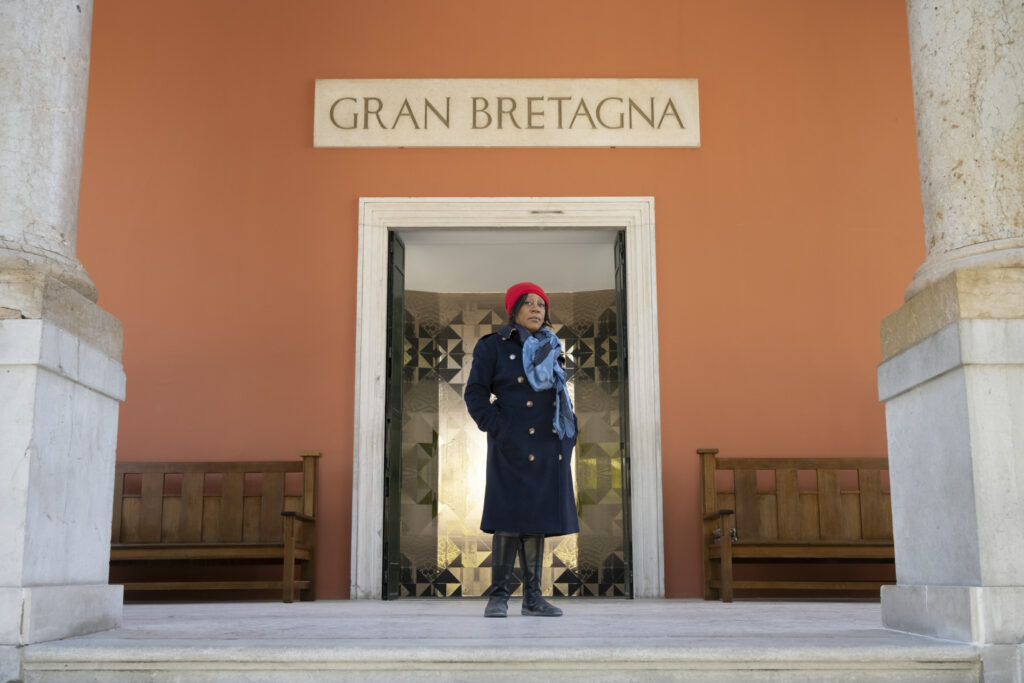
Wearing a sleeveless Burberry jacket (the luxury fashion house was the leading supporter of Great Britain at the Biennale this year), Boyce was cheerful but noticeably exhausted, having spoken at several events and to a range of journalists for the three-day pre-opening period. A couple of people also told me that the launch party for the British Pavilion got out of hand (in a vibrant, music- and booze-filled way). According to the British Council at the time of our interview, I was the last journalist she planned to speak to on the trip. The next day, she was announced as the winner of the top prize at the Biennale, the Golden Lion for Best National Participation, making her the first British artist to win the award in 29 years.
During our chat, I asked her what it’s like to be collecting many ‘firsts’ for her identity. In 1987, Boyce was the first Black-British female artist to have a work in the Tate’s permanent collection. In 2016, she was the first Black woman to be elected a Royal Academician. This year, she became the first Black-British woman to represent Britain at the Biennale. Her answer was unsurprising. “It’s meant to be an accolade, but it says you’re not meant to be here,” she said. “It’s a backhanded compliment that signals [a person] being out of place.”
Instead, Feeling Her Way addresses the celebration of Black British women with more nuance than the ‘firsts’ Boyce has unwillingly collected during her forty-year career. The show focuses on five musicians with different approaches to their craft: contemporary alt-pop and jazz singer Poppy Ajudha, classical jazz singer Jacqui Dankworth, Swedish experimental singer Sofia Jernberg, pop/folk singer Tanita Tikaram and composer Errollyn Wallen.
For Feeling Her Way, Sonia invited the musicians to improvise and collaborate at Abbey Road studios, one of the most famous recording studios in the UK. Clips of them singing, together and alone, are spread across the different rooms of the exhibition. In the exhibition’s first room, Errollyn guides Poppy, Jacqui and Tanita as they simultaneously explore different sounds and chants with unbridled spontaneity. “For a few years now, I’ve had a fantasy about my own girl band,” Sonia says jokingly. “This is a kind of iteration of that, but they all sing in very different styles[…] They’re bringing their own personalities to it. I’m not trying to make a pop song. I’m trying to bring a band together that somehow connects and disconnects at the same time.”
Part of what Sonia values about her body of work is taking a backseat in aspects of its development. “I don’t tell people what to do. I am definitely no director in these situations, and that’s purposeful,” she says. “I set up the situation, so I could say I’m a producer at that point, and then when the material (the footage, the sounds, and still photographs) come back to me, that’s when I play and edit. So, I’m going on a journey with that material because I’m seeing it for the first time and then making lots of decisions.”
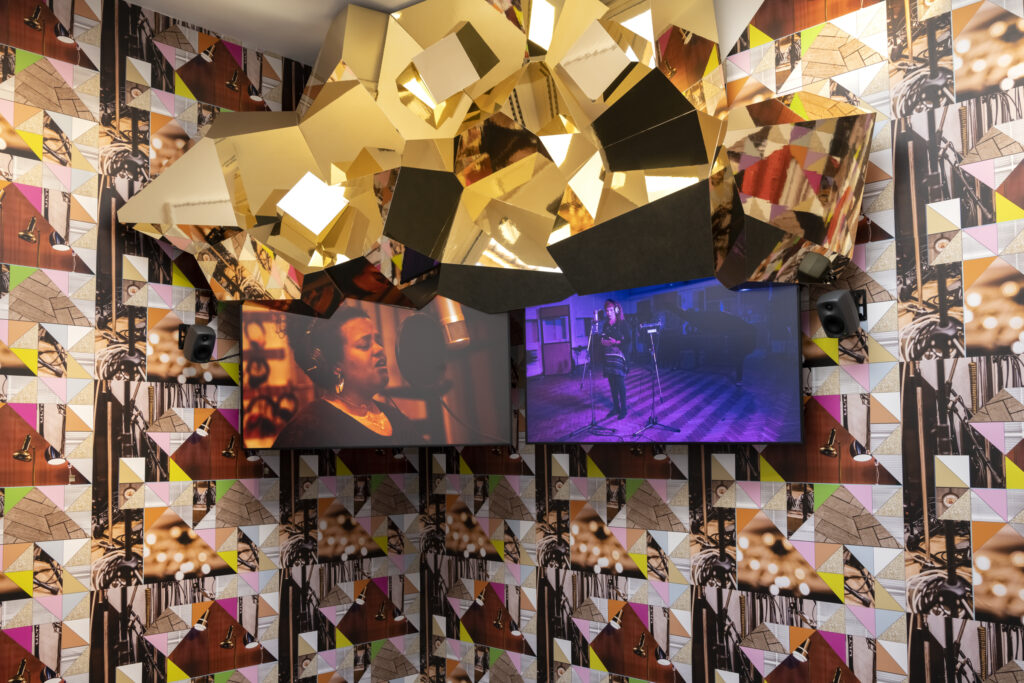
But in an age where many people listen to music through streaming services, Sonia’s continued approach of treating music as a physical object stands out significantly. In the fourth room, across the walls, Sonia presents items such as vinyl records, CDs, posters, images and ticket stubs that she collected over the course of six months in 2021. Price tags and other paraphernalia associated with previous sales of the items are also still present on some of them. “You see that something was £9.99 and is now 20 pence,” she says. “You can almost see the life of that object.”
That said, Sonia says there is also a downside to collecting these items in that you can see how the music of Black British female artists depreciate in a way that others don’t. For example, original Beatles albums increase in value over time, and some are now worth over £100,000. “But with [the performers I’ve collected], I haven’t seen any such kind of accruing of value, not even Shirley Bassey. Who in the world doesn’t know who Shirley Bassey is?”
Despite the idea of collaboration and improvisation being a solid theme within Sonia’s oeuvre, it is clear that every other aspect of her work is meticulously thought out, even down to the walls of the exhibition. In each room, the tessellated wallpapers reflect the musicians’ personalities. Nevertheless, the energy and playfulness of the patterns are also reminiscent of wallpaper found in the homes of African-Caribbean families, especially those who moved to the UK in the mid-20th century.
“Wallpaper is seen as this thing that sits in the background, and, for me, singers are also expected to operate in that way,” says Boyce. “They become just the background of our lives and not in the foreground. So for me, there’s an important relationship between those.”
But, despite the buzz her show gained even before it won an award, Boyce says she is still taking in what it means to win a Gold Lion. “I am, of course, delighted, overwhelmed and abundantly aware of the weight of history that this represents,” she tells me a few weeks after we initially met in Venice. “There are so many thank yous for all the amazing people I have had the great fortune to work with.”
Like what you’re reading? Our groundbreaking journalism relies on the crucial support of a community of gal-dem members. We would not be able to continue to hold truth to power in this industry without them, and you can support us from £5 per month – less than a weekly coffee.
Our members get exclusive access to events, discounts from independent brands, newsletters from our editors, quarterly gifts, print magazines, and so much more!

